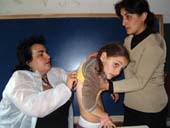Unknown disease strikes buffer zone villages
By Etuna Tsotniashvili
Tuesday, October 27

The Dvani villagers have a serious concern that the kidney diseases are being caused by chemical and biological residue left behind by the Russian occupying troops last year, who are still just 100 metres from the village. On Friday October 23 doctors from Gori and Kareli came to the village to provide medical assistance to the locals, who expected the doctors to tell them what was causing this problem. However it is impossible to draw any conclusion about this without the necessary medical equipment, which does not exist in the village.
Some villagers claim that the Russian occupiers, who are often seen from any part of the village, are deliberately polluting the air to cause various diseases. “Most of all we think that this is a Russian and Ossetian diversion. I think they are polluting the atmosphere with some unknown thing which is causing this disease,” Dvani villager Zaira Tigishvili said.
“Every morning they [the Russians and Ossetians] start shooting and this acts as our alarm clock,” Natia Samkharadze, a young mother with two small children, told the Messenger. “I am very scared because all the incidences of the disease in our village have occurred on the street where I live. I do not think it is the water, because the same water is being drunk by all of us, but I think there are some radiation elements, left behind by the occupiers last year,” Samkhadaze said. The International Rescue Committee, which has daily contact with buffer zone villagers and knows what is going on among the people, examined water from three different places in the village in response to public concern and proved that the water quality is satisfactory and not dangerous for heath.
One of the people hospitalised with the same symptoms as the rest was 6 year-old Giorgi Kopadze, whose kidneys were not functioning for two weeks. “He felt very bad. He started to vomit and have diarrhea. We took him to Gori Hospital but they sent us to Tbilisi. His condition was extremely bad, just on the edge of life and death. However after two weeks his condition improved and now he feels better, although we have to take him back to Tbilisi for regular observation,” Giorgi’s mother told the paper.
In the village of Mejvriskhevi, which was also occupied last August, Neli Ghinturi died last week. Despite the immediate intervention of doctors they could not save her life. Tsiala Ghinturi, the mother-in-law of the dead woman, said that medical assistance was rendered immediately but her toxification level was so strong that it killed her.
Doctors say that there is no need to panic but everyone with the observed symptoms should consult doctors immediately. Representatives of the Ministry of Health came to Gori to announce this.
Nika Tsertsvadze, representative of the Centre of Disease Control, stated that the disease starts with an esherikhia coli (e coli bacterium) appearing in the organism, which causes further difficulties. Minister of Health Sandro Kvitashvili said that people should not be scared because there is no threat of an epidemic, only a few people having been affected, though he could not explain what was causing the problem.
The kidney problems were initially discovered by the International Rescue Committee, which immediately alerted the Gori Municipality and the Ministry of Health. “IRC works in 45 villages in the adjacent area. During our monitoring in one of the villages, Dvani, the IRC Protection team identified four similar cases of health problems, which can be described as PWSNs suffering from disconnection of nephrites,” Peter Leifert, Country Director of the International Rescue Committee/Georgia told the Messenger.
“We were not able to find a Government laboratory that does free tests and decided that the IRC would pay for the testing of the water in Dvani. We received a water test report from Sanitation Monitoring Ltd., whose chemical and bacteriological analysis showed that the water was good and could be used for drinking and cooking purposes. It was not tested for radiation and toxins. The doctors could not identify the reasons why the PWSNs have the diseases,” Leifert stated.
Leifert added that in accordance with Georgian law, a Public Healthcare Centre is obliged to investigate a health situation after the identification of three similar cases. “The IRC cooperates with the Government and has already informed relevant agencies. We hope that the Government will learn more about the situation and identify whether it is an epidemic. If they do not have the resources to do this kind of analysis and diagnosis, they might address a request for assistance to relevant international organisations,” Leifert concluded.
“Today I’m here to see the special event in which six doctors from Gori have come to meet the people in the village to see what kind of issues they are facing in terms of health. IRC’s role is to try and help the people most affected by the war in this area that may not be getting any services from the Government. They may be cut off and by trying to get them help and monitoring the situation, IRC can let the Government know what is happening in these areas and help them to intervene,” added Tess Bresnan, Grants Manager, Asia and Caucasus Region.
So far IRC has identified 7 individuals in Dvani with the mysterious disease, of which one has died. The one person with the same symptoms in Mejvriskhevi is the one who died there. No cases have been reported in other villages.
